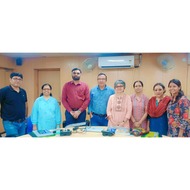
(View Complete Item Description)
As markets or production bases, China and India are becoming important and integral players in the global economy. Foreign direct investment (FDI), portfolio investments and outsourcing businesses have increased dramatically in these two economies. Despite the rising importance of these two economies on the world stage, our knowledge and analysis of these two countries in an integrated manner has remained poor. The two are often lumped together by business analysts as “emerging markets,” despite the substantial differences in their political systems, reform policies and business organizations. Academics, in contrast, have tended to treat the two countries separately, preferring to specialize in issues and questions specific to one or the other country.
The purpose of this course is to analyze these two countries within a coherent analytical framework. Our learning model is inductive, and heavily based on class discussions and participation. The group projects should aim at integrating analysis, knowledge and understanding of these two countries. We will also experiment with other forms of group projects, such as creating and working on business plans and those projects that integrate research from field trips with more traditional research, such as library research. There is no prerequisite but 15.012 (Applied Macro- and International Economics) and 15.223 (Global Markets, National Policies and the Competitive Advantage of Firms) are highly recommended.
Material Type:
Full Course
Author:
Huang, Yasheng







